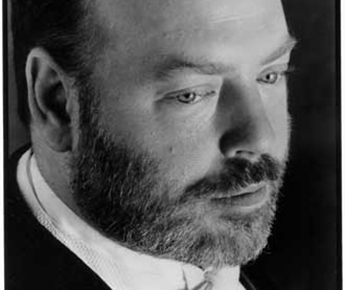New York, NY (Top40 Charts) The singer Sanford Sylvan passed away at his home in New York City at the age of 65 last week. Nonesuch Chairman Emeritus Bob Hurwitz, who was the label's longtime president, brought
Sandy to Nonesuch and served as executive producer on his recordings. He offers this remembrance.
I was in London in January 2002, for a festival of John Adams' music, the centerpiece of which was a concert performance of John's opera The Death of Klinghoffer at the Barbican Theater. It was only four months after 9-11. On that terrible day, by complete coincidence, John had been in London conducting Klinghoffer for the Penny Woolcock film version of the work; a few weeks later, the
Boston Symphony informed him that they were cancelling a subscription performance of the opera's choruses. Being in London for the Barbican performance was a fraught moment, easy to be caught up with many emotions about the world and politics, and about music and art. I wrote in my journal that day:
Thursday, January 17, 2002—Rehearsal of Death Klinghoffer at the Barbican. Grateful to be hearing it again, the singers are wonderful, and suddenly
Sandy Sylvan appears in the hall. I am so moved to see him; we have lost touch. I learn that he was in the air when the planes crashed into the buildings; that he has separated from his husband. He looks older and he sounds great, his singing has deepened, and, as always, he is a man of great character, completely "there."
Of the dozens of times I was around Sandy—at performances, recording sessions, when we got together to talk about recordings, when we bumped into one another on the street—I felt the same way I did when I saw him in London. He was always "there,"and when he sang, his commitment to the work was total, focused, without any excess. I cannot remember a single performance where I wasn't deeply moved; every time I heard
Sandy was memorable.
Even when he wasn't "there" (i.e. performing in a role he was identified with), I felt the presence of Sandy. The few times I saw Nixon in China without Sandy—and the singers who replaced him as Chou En-Lai were fine artists, without question—I was still always aware of him. I missed him and the wondrous sound of his voice, the kind of authority and tenderness that he gave to the role. Hearing others sing his role did not diminish my great pleasure in the opera, but
Sandy was on my mind every time I heard the opera after he had stopped performing it.
And sometimes he was "there" unexpectedly!
Sandy was not in the original cast of John and
Peter Sellars' A Flowering Tree, so imagine my joy when I went to a performance of the piece in New York and discovered in the program that
Sandy was in one of the key roles as The Storyteller. He once again inhabited the stage, and the character, as if it were the only role he had ever played.
I am grateful for the six albums he made for Nonesuch: three were works of John Adams (Nixon in China, The Death of Klinghoffer, The Wound-Dresser), three were recordings with the pianist
David Breitman. The most well-known of the recordings is Nixon in China, which of course is the album of its composer, John Adams, but in this one instance, I might also say that
Sandy had a bit of ownership as well. The great solo piece John wrote for Sandy, The Wound-Dresser, is the rarest of performances; he sang it with a kind of selfless devotion. It struck me that this piece belonged to him, that it might be nearly impossible to replicate what he brought to it.
Sandy understood in The Wound-Dresser that he was the messenger, or as a friend once referred to it, the postman: his job was to deliver what John had written for him.
Of the three recordings he made with
David Breitman—including an album of Fauré songs and Schubert's Die schöne Müllerin—I have the deepest affection for an American album, Beloved That Pilgrimage, which I have gone back to listen to almost every year since we brought it out. It is one of the real treasures of
Sandy and one of the real treasures of Nonesuch.
The obituaries about
Sandy this past week identified him as a baritone, but when I've listened to
Sandy for the last three decades, I rarely thought of that word. Of course he was a classical singer and teacher, and that was something that meant a great deal to him. But I think it is a description he transcended while performing, just as we don't put the word "tenor" before or after
Frank Sinatra or
Caetano Veloso and we would not add the word soprano or mezzo to describe Billie Holiday or
Judy Garland or Björk. They are singers, without labels. That's what
Sandy was for me.
The title of Beloved That Pilgrimage comes "The Desire for Hermitage," the final work from the Hermit Songs by Samuel Barber. I remember listening to it after it was first recorded and having to stop the tape from playing further; it was indescribably shattering.
Sandy sang it not as an interpretation of a set of words, but as an actor. He became the monk describing his life and awareness of his mortality, and I was haunted by the way he expressed those poignant words. And I am haunted hearing this song, once again, days after being told this very sad news.
Ah! To be all alone in a little cell
with nobody near me;
beloved that pilgrimage before the last pilgrimage to death.
Singing the passing hours to cloudy Heaven;
Feeding upon dry bread and water from the cold spring.
That will be an end to evil when I am alone
in a lovely little corner among tombs
far from the houses of the great.
Ah! To be all alone in a little cell, to be alone, all alone:
Alone I came into the world
alone I shall go from it.





















